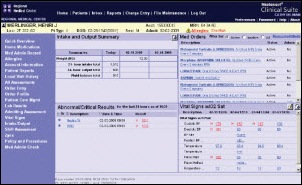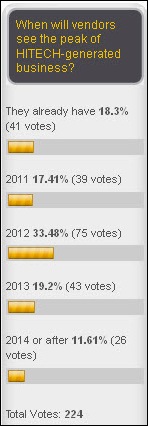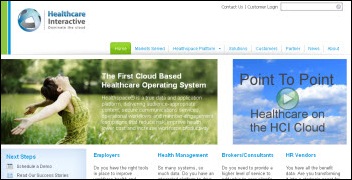There was a time when my company went through multiple rebrands. These were relatively minor shifts, but completely unnecessary. It…
Monday Morning Update 5/16/11
From Former CIO: “Re: high price of Epic. In my experience, the price of Epic software is competitive with others (at least the big guys). The difference is that they drive the customer to look at the true cost of implementation and plan for the resources, internal and external, training, etc. The other vendors hope you won’t actually add it all up until you sign the software contract. This is the best part about Epic since it gets the organization to accept the budget, even if difficult. If you are not prepared to spend the money then they may walk away. In the end, Epic is not necessarily more costly than the others would be.” An excellent reminder that I often need. Software license fees are often nearly irrelevant to overall project cost, especially on the often-forgotten cost of internal labor. It would be interesting to survey recently implemented hospitals to find out how implementation budget overruns correlate to specific vendors.
From Judy: “Re: couldn’t resist telling you. I have yet to receive an e-mail from iHealthBeat, HDM, or whomever that had a news flash I hadn’t already seen on HIStalk. Time to unsubscribe from these eJournals promising the latest, greatest news. Keep up the good work (although I do worry about you, truth be told) and help me SIMPLIFY my life! You should have NO doubts about your impact on this industry and I am SO proud of you!! Really.” I’m moved by that. From my vantage point, HIStalk has been eight years (as of June 20) of long evenings and weekends in an empty room, seven days a week (check out the count of my “sent” e-mails above from my HIStalk-only account). Comments like this keep me coming back, even though I’ll probably wonder on my deathbed what the heck I was thinking in spending all this time on what is basically a spare time hobby. At the moment, I’m still having a ball.
From IT Director: “Re: Siemens. At the recent Siemens Medseries4 User Conference in Salt Lake City, it was nice to see a strong message from Siemens leadership that Medseries4 is a go-forward strategy for Siemens. A recently approved five-year development plan increases focus on development already well under way on both the Clinical and Patient Financials as well as a much anticipated ‘spruce up’ of the General Financials. Also touted was a commitment to enhancing the integration of surround applications such as Pharmacy and EDM. This, combined with UHS’s (Universal Health Services) recent commitment to install Medseries4 in all 106 of its newly acquired facilities is certainly a positive note for Medseries4 customers.”
From Your Favorite Uncle: “Re: Lakeland in Michigan — confirmed. They are going up with Epic ambulatory at the end of the summer and inpatient at the end of the year.” Thanks.
From Nasty Parts: “Re: TSI Healthcare in NC. I hear they have been acquired. They are NextGen’s largest VAR.” Unverified.
From HealthCareIdiotSavant: “Re: healthcare IT stocks. My broker has found nothing other than the usual suspects and none of them are rated all that good. Would be interesting to have your investment banker dude weight in on investing in a fund or a reasonable combination of individual stocks, wit no promises or guarantees, of course.” I actually have quite a number of investment banker dudes (and maybe some dudettes) as readers, so if any of them care to advise (anonymously if desired), I’ll let you know. As you’ve found, not all that many pure HIT plays are publicly traded, though.
Poll respondents: next year will be the big HITECH hump for vendors. New poll to your right: do you trust CMS to accurately collect and report provider and quality data?
My latest Time Capsule editorial that hasn’t seen daylight since 2006 and even then only to print newsletter subscribers: Hospitals Need to Learn from Failed Transformation Missions. A snip: “Sometimes imaginary victory is declared at the HIMSS conference, proclaimed by ventriloquist vendors whose lips barely move when their customer speaks.”
Thanks to the following sponsors (new and renewing) that supported HIStalk, HIStalk Practice, and HIStalk Mobile in April (sorry it’s a long list this time, but there’s always a lot of activity right around HIMSS). As a non-professional part-timer, I’m humbled to see this impressive roster of supporters, especially since it represents just a four-week period. Click a logo for more information.
Ohio Valley Medical Center (WV), embroiled in a lawsuit with its former CEO, claims he struck secret deals with doctors that paid them exorbitantly and also diverted all the money from its endowment fund. The health system is laying off employees and says it is “tens of millions of dollars in debt.”
Congratulations to John Halamka, named a full professor at Harvard.
Healthcare Interactive, a Maryland-based vendor of something to do with the cloud that’s impossible to figure out from their buzzword-loaded Web site, looks to raise $10 million. Take your guess from this list of adjectives on their home page: suite, actionable, portal, stakeholders, transparency, engagement, cloud, and workflows. Or maybe this simple description from the CEO’s bio makes it crystal clear: “SaaS-SOA healthcare operating system (H-OS) framework leveraging an Inheritance-based Organic Network architecture using a unique combination of identity management, knowledge management and an application framework on a single cloud based environment.” Ready to sign up?
The next fun history lesson from Vince Ciotti, this time covering the 1960s development of “clinical” software, featuring Kelly Girls entering information dictated by nurses who didn’t know how to type.
Microsoft’s Bill Crounse, speaking in Hungary, gives examples of IT systems that are transforming healthcare: the Healthcare.gov Web site, NHS Evidence, and HealthVault. None of these have had any impact whatsoever on me or anyone I know (and Microsoft has a financial interest in at least two of the three), but I’ll give him the benefit of the doubt.
I’m intrigued by recent top executive hires by Siemens: John Glaser (Siemens Health Services Business) and Greg Sorenson (Siemens Healthcare), both brought in from non-profit Partners HealthCare with no business experience and immediately placed in CEO roles. Contrast that with GE Healthcare Systems, who chose as its top executive last week an internal candidate whose background is automotive, finance, and aviation with no healthcare experience at all. That’s a striking difference in philosophy from conglomerates that offer similar products and services. I have to say that as a customer, I like the Siemens approach a lot better — the idea that provider people who care enough about patients to work for a non-profit might bring something to the table that a circuit-riding GE lifer executive doesn’t.
Here’s the TEDxTHR talk of Ed Marx from this past Friday.
CMS gives General Dynamics a five-year, $95 million contract for claims processing support.
Clinical documentation system vendor Salar makes Fortune’s list of 100 fastest-growing inner city businesses with a 27% annual growth rate over the past five years. It’s in the Fells Point waterfront area of Baltimore.
Don Good, former NextGen Practice Solutions regional president, is named president of Talascend Healthcare, a newly created division of the technical professional placement firm.





















Siemens executive appointments. This is (finally) a very Siemens/German engineers corporate behavior. In Germany for various technology and engineering companies ‘Herr Doktor’ (at least a PhD) is the standard expectation for a senior executive. Moving between education/corporate/customer environments is seen as perfectly normal.
Accordingly to see Glaser and Sorenson move into these slots would not be surprising at all in Frankfurt or Munich. Contrast with here in the US where CPA’s and lawyers dominate. Both have their strengths and weaknesses as executive competence is often not related to particular professional training/education at all, despite what the MBA programs might want to tell you 🙂
@FormerCIO: that sounds like a tailor-made Epic sales message. What’s comical is that people like you fall for it. Epic swears that on the front end, their predictions on budget will be accurate, and of course you will save money compared to their competitors. Except when you hire a bunch of consultants to do things other vendors provide for free, overpay for scarce human resources who are able to implement it, divert clinical resources from other departments in the hospital to support the Epic project, spend a lot of money on trips to Madison, buy other add-ons to do things Epic either can’t do well or at all, and muddle through trying to make the Epic system work with anything else you might have in the hospital, you’ve more often than not blown up those budget projections, gone way over cost, and wasted a lot of money that could’ve gone to more useful projects in the health system without getting anything more for your money than if you had bought any system from any other vendor. But hey, at least you get invited to the annual weenie-roast in Madison, right?
On Siemens, you kind of do wonder where they are going with Health IT and they are probably like the rest of us trying to figure out the same thing:) Back at the end of 2010 they worked with HealthVault to launch Assiignio based on the HealthVault platform in Germany. Also what I found interesting too is their partnership with Positive ID, the implanted chip folks we thought had died and gone away, and apparently that’s not the case:)
The license agreement grants PositiveID rights to utilize key intellectual property and Siemens’ patent titled “Method and System for Identification of a Medical Implant” using RFID. Who knows where this will end up with the chip getting attention again with a wireless network monitoring system. Just let someone come up with a “proof of concept” today and someone seems to come along and fund it and of course there’s the “data” side here to consider as well and if there’s any money to be made there. Walgreens recently said their data marketing business was worth $800 million, so who knows?
http://ducknetweb.blogspot.com/2011/01/positiveid-chip-people-are-back.html
Hiring a CxO or business executive/director without an MBA is like hiring an engineer without an engineering degree.
Just saying.
… even though a lot of companies do just this…. they don’t know what they don’t know.
Agree that a person needs to have certain qualifications to get any management job. The ideal is to have a person who is a good manager (MBA) that also has a solid technical background related to that business unit. The individual is more important than the degree though.
By the way, has anyone heard of a hospital that actually successfully attested for Meaningful Use yet?
Regarding Healthcare Interactive, I agree some of these companies go so far over the top trying to differentiate themselves they become ridiculous. I have worked for many companies whose leadership uses this type of non-speak thinking it make them appear smart or visionally. 99% of the time none of them has ever closed a deal or made a company successful. This guy forgot “disruptive” in his list of bull.
Hook expresses an anti-Epic theme that seems to come up regularly on this Blog. That, somehow, so many hospital organizations are naive and uninformed because they have chosen Epic. Is that really possible? Do we really think that the IT and Operational leaderships of several hundred of the largest healthcare organizations in this country don’t know something those commenting in this blog do? Face it, Epic has been winning over so many customers because they have the right functionality at the right time in the current marketplace. And they can command a higher price because the competitiors don’t come close.
Hook Line & Sinker is right on message, how often does one read that EPIC’s install initially budgeted for 100 million ended up being $160 million……and hell it only cost Kaiser a couple of Billion, right???
Yes, I do think that the hospital CIO’s and leadership IS that naive…….EPIC is winning customers, because the big boys rolled over, that I will grant you……..but it’s not because they keep their word, understand one iota of healthcare workflows, or have anything close to an intuitive, user friendly, customer service, flexible or a ROI type product……..EPIC is nototrious for going over budget, not delivering on milestones, and negatively impacting, hospital and practice A/R…….but to quote Fast Eddie Phelson and Tom Cruise’s character, Vincent, in The Color of Money….”Nine ball is for bangers.” “But there’s a lot of people doing it, and if there’s a lot of people doing it, that’s a lot of people doing it”………Lemmings all of you
The comments about Epic projects going over budget are interesting, and true. The point is that if you do a poor job of project planning and management, including an appropriate contingency, you are at risk (or more?0 of an overrun. If your clinicians did not really look at the workflow tools and did not think about how the system will impact the business (and, BTW, who does?) then you will have issues. If the CEO just selects a vendor without allowing adequate evaluation you will run into a problem. Did you send physicians into another site on the units and/or clinics? If not why not?
All vendors are skilled at misdirection and obfuscation. It is up to the buyer to be smart in selection and project planning. If you can’t take the time on the front end you surely will on the back end. This is true of every vendor I have ever encountered.
Former CIO: Perhaps if the leaders and project managers from the vendor weren’t fresh out of college still trying to understand the difference between copay and coinsurance? Or perhaps, if “model system” meant a flexible system that can be designed to meet a client’s healthcare workflows, rather than, there’s only one way to do something……you would have a point. However, I feel the fault lies therein with the folks/designers in Verona, and the shortsightedness and assumptions of future CIO’s, who assume if everyone is doing it, then it must be the way to go, rather than asking the tough questions about flexibility, customization and workflow design…………….
I’d love to know where and how “MBA” == “Good manager.” In many industries, the opposite it true.
IMO, the MBA programs have been watered down so much that unless it’s from one of the top handful or programs, it’s meaningless.
$10 says that both folks who posted pro-MBA are MBAs themselves. I’m MBA and went to fine schools and I “learned” next to plenty of idiots. Didn’t we all?
If you assume that CIOs are making these decisions then I believe you are in the wrong pew. There is no way that CIO should or could do that. These decisions are CEO decisions, with support from the CIO. It really does not matter if it is Verona or Kansas City or Westwood or anywhere else – the buyer needs to take responsibility for understanding the implications of the purchase. No vendor has ultimate flexibility to match your workflow as they currently exist and, by the way, maybe that is good. Years ago it was buy SMS or IBM or TDS or whomever. That did not work because users didn’t do their homework then or now.
You see, sir, the problem is you’re ALL genuflecting at the altar of her highness, Queen Judy, you folks are in the wrong temple, let alone pew…….I do agree with you on one point, however, the buyer needs to stop abdicating so much power to the vendor, like the ones who sign with EPIC do…..ultimately, then they go in making assumptions based on empty promises…..
Former CIO: I think you are letting CIOs off too easy. Yes, technically the decision ultimately rests with the CEO and the Board, however, most CEOs rely very heavily on the recommendation of their CIO (and hopefully CMIO, CNO, etc). So while I agree that the CIO doesn’t technically make the final decision, in my experience, the CIO’s opinion is one of the most influential in determining the decision of the CEO and the Board. I’m not advocating that…just saying I have seen it play out that way multiple times.